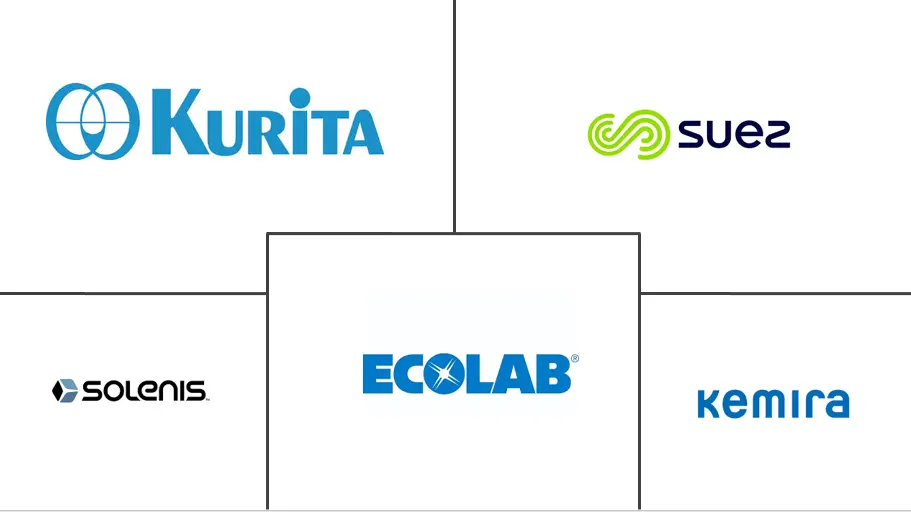Market Size of South America Water Treatment Chemicals Industry

| Study Period | 2019 - 2029 |
| Base Year For Estimation | 2023 |
| Forecast Data Period | 2024 - 2029 |
| Historical Data Period | 2019 - 2022 |
| CAGR | 3.50 % |
Major Players
*Disclaimer: Major Players sorted in no particular order |
South America Water Treatment Chemicals Market Analysis
The market for water treatment chemicals in South America is expected to grow at a CAGR of around 3.5% during the forecast period. One of the major factors driving the consumption of water treatment chemicals is the conformance to stringent environmental regulations. However, the hazardous nature of hydrazine is expected to restrain the market studied during the forecast period.
- The shifting focus onto the usage of green chemicals is likely to provide a major growth opportunity for the market studied during the forecast period.
- Oil & Gas industry is accounting for the major share of the market among the end-user industries currently and is expected to continue its dominance during the forecast period.
- Among the South American countries, Brazil is currently dominating the market studied and is expected to grow at the highest rate during the forecast period.
South America Water Treatment Chemicals Industry Segmentation
The South America Water Treatment Chemicals market report includes:
| Product Type | |
| Flocculant & Coagulants | |
| Biocides & Disinfectants | |
| Defoamers & Defoaming Agents | |
| pH & Adjusters & Softeners | |
| Scale & Corrosion Inhibitors | |
| Others |
| End-user Industry | |
| Power | |
| Oil & Gas | |
| Chemical Manufcaturing | |
| Mining & Mineral Processing | |
| Mining and Mineral Processing | |
| Food & Beverage | |
| Pulp & Ppaer | |
| Others |
| Geography | |
| Brazil | |
| Argentina | |
| Rest of South America |
South America Water Treatment Chemicals Market Size Summary
The water treatment chemicals market in South America is poised for steady growth, driven primarily by the need to comply with stringent environmental regulations. The market is experiencing a shift towards the use of green chemicals, which presents significant growth opportunities. The oil and gas industry is the predominant end-user, maintaining its leading position due to the sector's substantial water treatment needs, particularly in managing produced water. Brazil stands out as the dominant player in the region, with its burgeoning oil and gas sector and rapid urbanization fueling demand for water treatment solutions. The country's efforts to enhance its water treatment infrastructure, coupled with its economic growth, further bolster the market's expansion prospects.
Brazil's position as the largest economy in South America and its fast-paced development contribute to its dominance in the water treatment chemicals market. The country's oil and gas industry, supported by initiatives to increase production, is a major driver of market demand. Additionally, the lack of adequate sewage treatment facilities in Brazil's major cities underscores the need for improved water treatment solutions. This scenario is expected to lead to increased usage of water treatment chemicals, supported by government plans to establish proper facilities. The market is moderately fragmented, with key players such as Solenis, Ecolab, Kemira, Suez, and Kurita Water Industries Ltd. playing significant roles in shaping the competitive landscape.
South America Water Treatment Chemicals Market Size - Table of Contents
-
1. MARKET DYNAMICS
-
1.1 Drivers
-
1.1.1 Conformance to Stringent Environmental Regulations
-
1.1.2 Other Drivers
-
-
1.2 Restraints
-
1.2.1 Hazardous Nature of Hydrazine
-
1.2.2 Other Restraints
-
-
1.3 Industry Value-chain Analysis
-
1.4 Porter's Five Forces Analysis
-
1.4.1 Bargaining Power of Suppliers
-
1.4.2 Bargaining Power of Consumers
-
1.4.3 Threat of New Entrants
-
1.4.4 Threat of Substitute Products and Services
-
1.4.5 Degree of Competition
-
-
-
2. MARKET SEGMENTATION
-
2.1 Product Type
-
2.1.1 Flocculant & Coagulants
-
2.1.2 Biocides & Disinfectants
-
2.1.3 Defoamers & Defoaming Agents
-
2.1.4 pH & Adjusters & Softeners
-
2.1.5 Scale & Corrosion Inhibitors
-
2.1.6 Others
-
-
2.2 End-user Industry
-
2.2.1 Power
-
2.2.2 Oil & Gas
-
2.2.3 Chemical Manufcaturing
-
2.2.4 Mining & Mineral Processing
-
2.2.5 Mining and Mineral Processing
-
2.2.6 Food & Beverage
-
2.2.7 Pulp & Ppaer
-
2.2.8 Others
-
-
2.3 Geography
-
2.3.1 Brazil
-
2.3.2 Argentina
-
2.3.3 Rest of South America
-
-
South America Water Treatment Chemicals Market Size FAQs
What is the current South America Water Treatment Chemicals Market size?
The South America Water Treatment Chemicals Market is projected to register a CAGR of greater than 3.5% during the forecast period (2024-2029)
Who are the key players in South America Water Treatment Chemicals Market?
Solenis, Ecolab, Kemira, Kurita Water Industries Ltd. and Suez are the major companies operating in the South America Water Treatment Chemicals Market.

